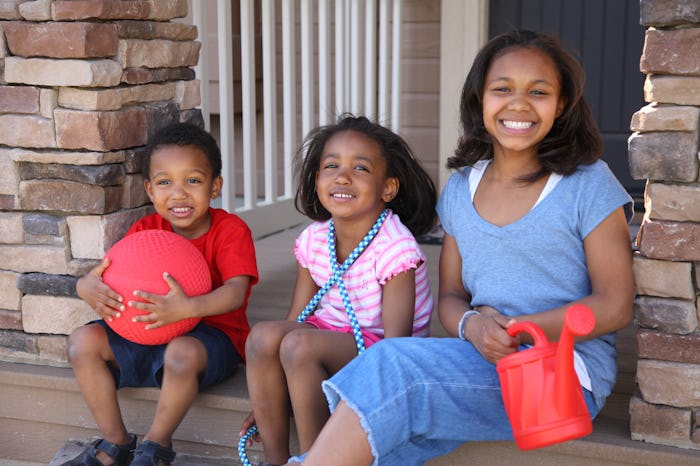Life

Here's How Having A Lot Of Siblings Can Influence Your Baby's Social Behavior
I grew up in a large family, and always thought that my gregarious, outgoing, ambivert nature was due at least in part to the fact that I always had siblings, aunts, uncles, and cousins around. But was that the real reason? Are babies with lots of siblings more social?
The Journal of Family Psychology reported that the interactions between siblings is crucial in the social and personal development of children who are fortunate enough to have siblings. The relationships are not always rosy, as anyone with a sibling can tell you, but they do provide an additional layer of social support during a critical period of development for children.
"Social and emotional experiences with primary caregivers, as well as interactions with other children and adults early in life, set the stage for future academic and personal outcomes, and undergird other areas of development," according to The Journal of Applied Developmental Psychology. But what does that mean for their personality? Are babies with lots of siblings more social, or just, perhaps, more socially aware thanks to their everyday interactions with their family members?
I spoke with Shane G. Owens, Ph.D., ABPP a psychologist who is board certified in behavioral and cognitive psychology, and he tells Romper, "While kids with siblings are probably not more social than kids without siblings, they have more opportunities to practice social skills than kids who don’t have brothers or sisters." Even if say, like in my family, those social interactions included a fair amount of early use of swear words, and various threats on one's person and/or property.
"Kids with siblings are almost constantly practicing sharing, taking turns, and more complex skills like reflective listening and taking perspective," Owens says, unlike those without siblings, who are forced to learn these interactions through playdates, outings, and day care.
"There’s also the advantage of learning from watching your brother or sister," he says. "Sometimes kids learn how not to get in trouble or hurt others’ feelings by watching their siblings make those kinds of mistakes. This is called social learning and is a vital part of surviving and thriving throughout anyone’s life." And when it's your baby brother whose feelings you hurt, you're pretty sure he'll forgive you, thanks to the close-quarters living situation. Even if you did ruin Super Mario Brothers by accidentally-on-purpose pouring Diet Coke into the opening.
Meghan Walls, PsyD, pediatric psychologist, division of behavioral health, Nemours Children’s Health System tells Romper that the idea of social development isn't linear or precise. "There is evidence to suggest that ‘only’ children have skills similar to children with siblings, but that they are chosen more by teachers and are sometimes more outgoing," she says. "Most studies find that the number of friends a child has doesn’t vary much between kids with and without siblings."
Social behavior is not the same thing as being innately "social." Walls tells Romper, "Compared to adults who grew up with siblings, adults who grew up as ‘only’ children have less frequent social activities with relatives, and the difference is even greater among those who did not live with both parents growing up." That might mean that a baby appears "less social," but that doesn't mean that they are less social, only that they're less practiced at the activity.
However, by the time kids are grown up, there isn't any noticeable difference between those kids who had siblings and those who don't. Babies and children develop on their own path, and while there are advantages to having siblings, an only child will likely end up doing just fine in the long run.
Studies referenced:
Darling-Churchill K, Lippman L. (2016) Early childhood social and emotional development: Advancing the field of measurement. Journal of Applied Developmental Psychology, https://www.sciencedirect.com/science/article/pii/S0193397316300053?via%3Dihub
Experts used:
Meghan Walls, PsyD, pediatric psychologist, division of behavioral health, Nemours Children’s Health System
Shane G. Owens, Ph.D., ABPP, psychologist, board certified in behavioral and cognitive psychology
This article was originally published on